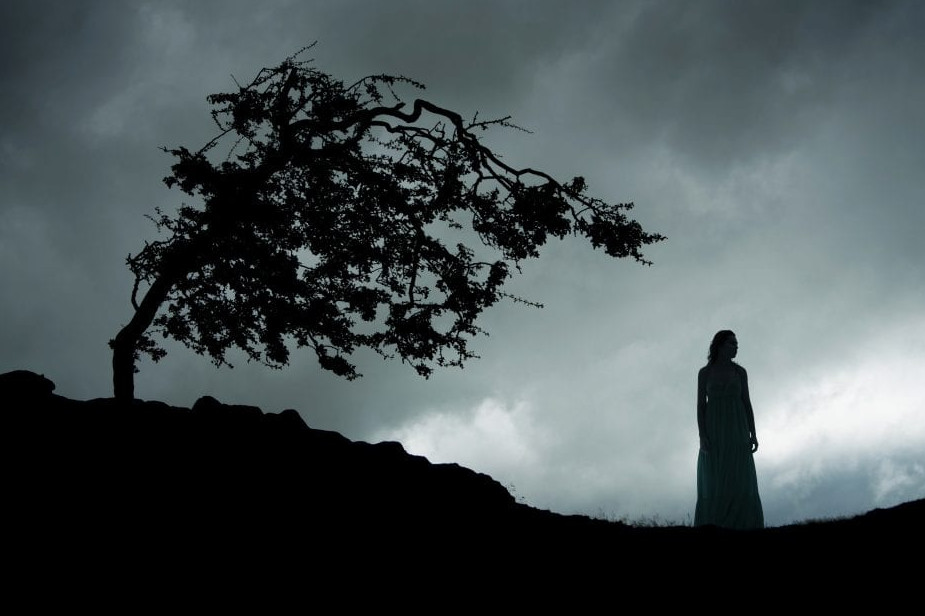
For a while it looked as though this show would have a real ‘live’ audience at the Redgrave, but sadly it was not to be. That is a great shame, for this production of Far From The Madding Crowd is gorgeous to look at and choc-full of excellent performances.
Hardy’s tale of love, loyalty and betrayal in the West Country is most certainly a big read, but adapter Mark Healy has skilfully trimmed it down to create a play that focuses sharply on the four central characters, three of them deeply flawed. Beautiful Bathsheba Everdene gains the amorous attentions of three men. One of these suitors is William Boldwood, a neighbouring farmer who is the epitome of a man who can’t take ‘no’ for an answer. Dewi Wykes vividly portrays him as a stiffly formal man whose bottled-up feelings for Bathsheba are a serious threat to his deep sense of personal pride and dignity. Though he is rather too young to play the part of a lonely old bachelor in his forties, Wykes’ gives this ‘man of stone’ a touching vulnerability, and when his repressed emotions can no longer be contained, we see real, unrestrained passion.
Bathsheba has a chance encounter with the reckless and irresponsible Sergeant Troy, and though she knows his ‘words are too dashing to be true’, she falls prey to his flattery, and marries him. Francis Troy can be seen as an out-and-out villain, for he has abandoned poor Fanny Robin, having made her pregnant. However, in James Jip’s nuanced portrayal we see an intelligent, educated man clinging to the remnants of moral sensibility, but fatefully swept along by the romance of his own honeyed words. The scene where he weeps over the bodies of poor Fanny Robin and her dead baby is both moving and shocking; his tears are real, but so is his cruelty to the horrified Bathsheba, who now sees that he never truly loved her.
The third of the ‘three cocks after one hen’ is Gabriel Oak, the best shepherd in the county. Oak is invariably the best man for the job, whether rescuing Bathsheba’s farm from a fire or curing her sick sheep. He’s the best man for Bathsheba, too. Jake Kenny-Byrne endows Oak with a quiet, undemonstrative nature, though he becomes furious if anyone dares to criticise Bathsheba. Even when she has unjustly dismissed him from her employ, he will not tolerate hearing any gossip about her: ‘She’s a good woman, worth any ten of you!’ he cries.
What of Bathsheba herself? Wilful and blindly stubborn, she can be exasperating. ‘I will astonish you all!’ she exclaims, but we are often astonished by her foolishness. If we are to care for her trials and tribulations, we need to feel that she is worthy of our sympathy despite her many failings. Amelia Paltridge succeeds magnificently in creating a Bathsheba that we can both despair of and admire. In her amusing interchanges with her farm workers she reveals her flighty, girlish nature one moment and her steely determination the next, and in her interchanges with the three men in her life we see her strong moral sense, but also how vulnerable she is to impulsiveness. Paltridge’s magnetic performance is of a young woman who has to learn very painful lessons about her own character before she finds deserved happiness.
Among the minor characters, Lionelle Nsarhaza is a delightfully cheeky Liddy Smallbury, often showing a sharper understanding of human nature than Bathsheba, and Theo Spofforth is splendid as Joseph Poorgrass, a burly rustic lummock whose sweet singing voice comes as a delightful surprise.
This show packs a lot of plot into its 2 hours and 25 minutes, so inevitably there are very many short scenes. Designer Max Dorey has created an attractive and very flexible set that serves to represent all the various locations, and choreographer Jonathan Howell has responded imaginatively to the challenge of presenting such diverse events as a sheep-gathering, or Sergeant Troy swimming out to sea. Scenes intercut with cinematic swiftness, giving pace and energy to this complex tale. Director Paul Chesterton has gleaned characterful performances from his young cast, and once again the BOVTS has shown that, despite all our current difficulties, there is much to be optimistic about regarding the future of live theatre. This Far From The Madding Crowd is a splendid achievement. ★★★★☆ Mike Whitton 6th December 2020

